Recently in Multimedia Category
Hyde Park Progress, an excellent local blog that focuses on economic development in the neighborhoods around campus, is holding a contest for students: Write a short blog post on the problems with the rental units or the management of Mac Properties, to balance the blog's usually favorable reports, and win dinner at a local sushi joint.
"We've heard grumblings among students that Hyde Park Progress is too soft on Mac Properties and Antheus Capital, and that we praise them too much for their investment in the neighborhood and their ambitious rehab projects," blogger Elizabeth Fama writes.
Well, here's your chance to vent. Here's your chance to counteract our glowing reports. Here's your chance to tell us about the seamy side of the student rental market."
--Yi Fu Tuan, Space and Place
Today I learned something I didn't know before about Chicago. Did you know that there wasn't a single conviction for murder in connection with organized crime in Chicago until 1997? That means no one in Al Capone's era or for a long time afterwards ever spent a day in prison on a murder conviction. This was not what I expected to learn at a poetry discussion.
Chances are good that if you are at the University of Chicago, you probably come from somewhere else. Chicago is not your home, which is to say that you are not from Chicago. You may go so far as to say that you are not of the city, precluding the chance that you might ever give your heart over to it, no matter how long you reside here. But let's face it--you chose to come to school here.
Even in a bubble, even in a microcosm like a university, there is still a tie to the community that informs it, nurtures it, and supports it. If that relationship is functional, than it is almost symbiotic. The university benefits from bringing the community into its walls. Conversely, the community benefits from having students and faculty interact with a community's neighborhoods. A place is, after all, to a certain extent what you make of it. But, "what has that got to do with poetry?" you might ask.
Questions about shared values, particularly about what it means to be in America's "heartland," are central to the project of the Heartland Exhibit at the Smart Museum. Bill Savage, an English professor from Northwestern University, gave an insightful inaugural lunchtime discussion, the first in a series of such discussions, on Friday, 16 October 2006.
Mr. Savage, a native author as well as academic, charted a course in Chicago's lyric idiom that ranged from Carl Sandburg's eponymous "Chicago" to Tony Fitzpatrick's poem "Pimp Dog" with its companion collage.
Location is important in literature. If the "heartland" is supposed to be a metaphor for how America attempts to re-center its values, argued the guest speaker, than it is important to understand how Chicago writers have been deeply involved with this effort. He cited a tradition that includes authors examining tough, realistic moral and ethical quandaries, writers like Theodore Dreiser, Nelson Algren, and Saul Bellow.
For poets as part of that tradition, Chicago provides rich subject matter, a place to explore the city's inherent identity conflicts. In the course of an hour, we saw how Carl Sandburg eschewed high-minded diction to sound more like the man on the street. We saw how Gwendolyn Brooks explored Chicago spaces in poems like "kitchenette building" and "vacant lot," spaces that are not only physical locations but also expressions of the psyche and temporal distance.
In the poems "Mowing" and "kitty-corner," Stuart Dybek mused on how the city's spaces are continually changing. In the ever-transforming urban landscape, the poet sees the disappearance of public phones and newspaper kiosks as signs of communal disintegration. He begs the question, "what will become of us?"
Tony Fitzpatrick paired word and image to provide a moving meditation on the murder of Fred Hampton, a leader in the Black Panther movement, in 1969, an event that spurred the poet's family to flee their neighborhood. These poems have a hard edge because they ask tough questions. An artist of integrity takes that scrutiny of the world surrounding her. It is a starting place in an ongoing dialogue about making ours the kind of place we want for a community.
So even if you missed the talk, you have plenty of chances to make an engagement with those kinds of questions. All you have to do is walk over to the Smart Museum and spend an hour or so with the exhibit. Their next talk will be at noon on October 30th when Martin Marty, professor emeritus with the Divinity School, and Daniel Block will speak on religion, nature, and food. Who knows--you might learn something interesting.
Click here to learn more about the Smart Museum's Heartland, and here to learn more about the Chicago Studies-sponsored creative writing contest.
Eric Mcmillan is a graduate student in the Masters of Arts Program in the Humanities
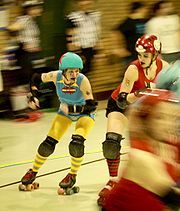 Student Documentary Showcase
Student Documentary ShowcaseFriday, June 5 from 6 to 9 pm.
Film Studies Center, Cobb 307
A fantabulous showcase of recent short works produced by the students in Judy Hoffman's Documentary Production course. "Spanning an impressive array of subjects, from the ideological and tactical role of army combat uniform in the U.S. military and the imminent extinction of the hipster community in Chicago, to counter-cultural movements like the Lolita fashion, Chicago's own fierce and world-famous Roller Derby Women's league, as well as urban agriculture task forces and the city's cutting edge music scene. This extraordinary program is a witty and insightful exploration of Chicago's unique soundscape, unexplored corners, and most colorful characters."
Some related sites I recommend:
- Windy City Rollers
- Chicago Advocates for Urban Agriculture
- Transmission Blog on Gaper's Block
- Hipster: The Urban Dictionary Definition
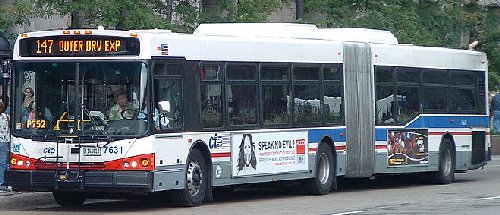
One of the sixty-foot articulated buses that Hyde Parkers recognize from rush hour on the #6 Jackson Park Express cracked while in use. No passengers were on board, but as a precautionary measure all 226 buses of this model are being pulled from the fleet until they can be inspected for safety.
CTA, Metra, and PACE are all facing nasty budget shortfalls. Internal budget trimming may not be enough to stave off the dreaded fare hikes and possible service cuts entailed in every CTA doomsday package.
A paperwork slip-up led to the temporary deactivation of all DePaul students' U-Pass farecards. Service is expected to return this weekend.
On Wednesday a woman was sexually assaulted at knife point off the Western Blue Line stop.
A passenger accused of boarding a bus without paying was very forcibly ejected by a Chicago police officer. I'm keeping my eyes peeled to see if brutality charges are pressed. Check out the video taken by a passenger. Trigger warning and foul language.
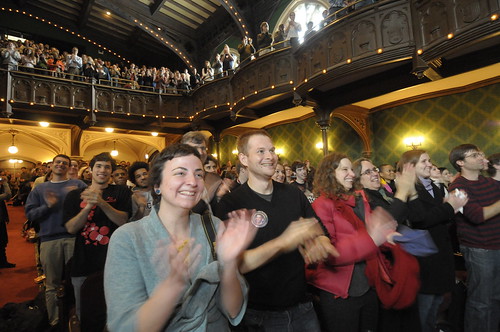
Thank you to the folks who have shared their personal perspectives on the Inauguration with Chicago Studies! Here's a selection of photos and writing from Chicago Studies staff and friends.
First, pre-k students in snow boots and formalwear.
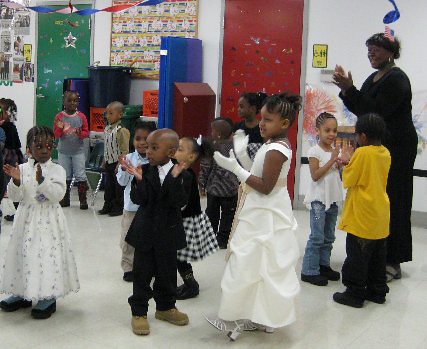
Inauguration day in Hyde Park by Chicago Studies. The pre-kindergarten students of Bouchet Math and Science Academy dress up for their own "Inauguration Ball." (Photo by Rachel Cromidas)
Mandel Hall was packed during the Progress and Politics event on Tuesday morning. Robert Gooding-Williams, Professor of Political Science at the University of Chicago, and Charles Branham, Senior Historian at the DuSable Museum, led a discussion after viewing the inaugural address.
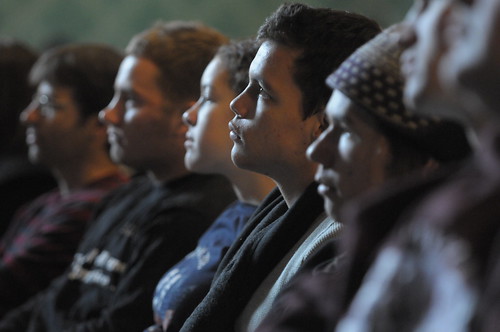
Photo by Lloyd DeGrane.
Kelin Hall records the cautious optimism of Branham and Gooding-Williams.
Aretha Franklin's performance, he said, changed his expectations for national hymns, and Elizabeth Alexander's poem was the "most engaging, least predictable," part of the event, which "brought it back to the ordinary," affirming Obama's message that we need changes not just in policy, but in the way we treat each other.
Showcasing African American talent, Gooding-Williams said, symbolically affirmed the African American accomplishment. Branham said that in contrast, the "bombastic" nature of the inauguration's opening sermon and introduction, and the un-nuanced linking of Obama with King's legacy, left him "unimpressed."
Supriya Sinhababu reports on inauguration-watching events in Hyde Park.
While Obama's barber Zariff took in the inauguration from the National Mall, Tony Coye tended to the shop's customers between media interviews. Coye says an average of two or three people per day come in asking for the same cut Obama gets.
"I have a client coming in today--her hair is down to her butt," Coye said. "She's getting an Obama cut."
Thalia Gigerenzer watched the inauguratioin from Valois Cafeteria on 53rd Street.
"I remember him handing out literature on the street corner," said Jimmy Prowell, 70. "At first it was hard to imagine him in the White House."
With its cheap eats and friendly conversation, Valois has become a symbol of the diverse community that made Obama--a fact that was not lost on the seven TV stations that marched into Valois armed with video cameras and microphones.
An employee at Valois Cafeteria--a longtime Obama hangout--take time out to watch Tuesday's inaugural program. Photo: Thalia Gigerenzer
For more student coverage of the inauguration, check out the Chicago Studies inauguration cluster or the Chicago Studies Presidential Inauguration Flickr stream.
The Blog that Works has collected some links for Chicago-area Inauguration info:
- The Reynolds Club and the Blue Gargoyle are hosting viewing parties on Tuesday morning
- Chicago area Inauguration Day Parties
- Chicago Reader on Obama
- Chicago Reporter: 50 Voices in 50 Days Blog Coverage
Check the Chicago Studies Flickr feed for new Inauguration-related photos

The Blog that Works is out of winter hibernation at just the wrong time-- today's subzero temperatures are making any activity that doesn't involve hot chocolate and my living room seem entirely unappealing. This morning my car refused to budge out of its iced-in parking spot, giving me a personal snow day and lots of time to think about how to get around without it. Here's a roundup of Chicago transit and winter news, brought to you by my temporary homeboundedness.
Hyde Park Progress considers the pros and cons of adopting various parking meter rate schemes. Chicagoist analyzes last year's big increase in CTA ridership, but a commenter suggests an alternative interpretation. The Tribune documents some clever techniques for maintaining a parking space-- if only they'd published yesterday, I might have made it out of Hyde Park today! A fourth-grader in Hammond fell victim to a triple-dog-dare and ended up with a tongue injury. The Chicago Foundation for Women is honoring an important anniversary this week with a spoken word event. And for a nice healthy dose of winter escapism, check out these nifty shots of fractal river deltas near the Mediterranean coast.
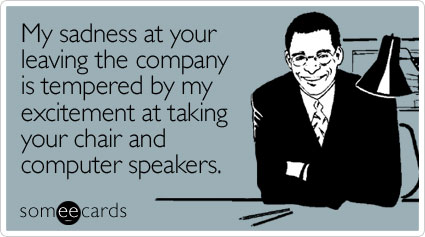
- The NYT's Lede Blog has good coverage of Governor Blagojevich's current legal troubles and impending doom. Chicagoist has good coverage of his future as a children's toy. The Smoking Gun has transcripts. Blago's got a dirty mouth!
- Tribune Co., umbrella over the LA Times and Chicago Tribune, has filed for bankruptcy and is requesting $125 million to cover costs while it restructures its $13 billion debt.
- No actually. $13 billion. If each of those dollars was a penny, and we stacked them all in a tower, it would be about 12,831 miles high. That's 20,000 km and change if you're one of those metric folks, and about a minute and fifty-five seconds if your conception of space was formed by The Powers of Ten:
- From the "Kids today with their long hair and iPod machines" file, kookiness will soon be afoot at the Art Institute. Naked kookiness, in fact!
edit 12/10/08 1:10 to include juicy tidbits from The Smoking Gun.
via Gapers Block.
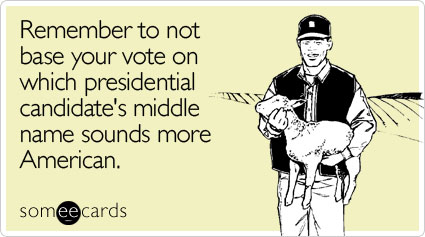
Have a story from your election day or campaign experience? Share your comments below.
Photos from campaign work or election day celebrations? Post them to Chicago Studies Flickr Stream.
Find your Chicago polling place at the Chicago Board of Elections.


Recent Comments
buy tao of badass on Remembering "The Killing Floor": A Look at Chicago's Labor Union History: Do you min
upload document on Much hospitality this weekend...: I was sugg
ragingbullalert.Info on Much hospitality this weekend...: This site
buy sonic producer on Remembering "The Killing Floor": A Look at Chicago's Labor Union History: I've gone
Juliane on The Year of the Jello Mold: Very great
selma web design on Haiti Earthquake Response: Hey there.
essay writer on SonicChicago: Voices from the Hyde Park Book Sale: Do you hav
VangSandra29 on SonicChicago: Voices from the Hyde Park Book Sale: Some time
Berlin Germany on 'You Gotta Go Get It': Caesarei Marsh of the Living Room Cafe in Woodlawn: I'd like t